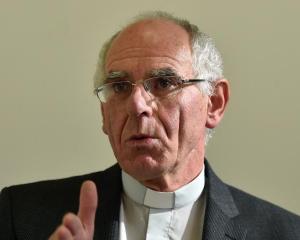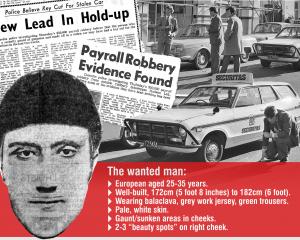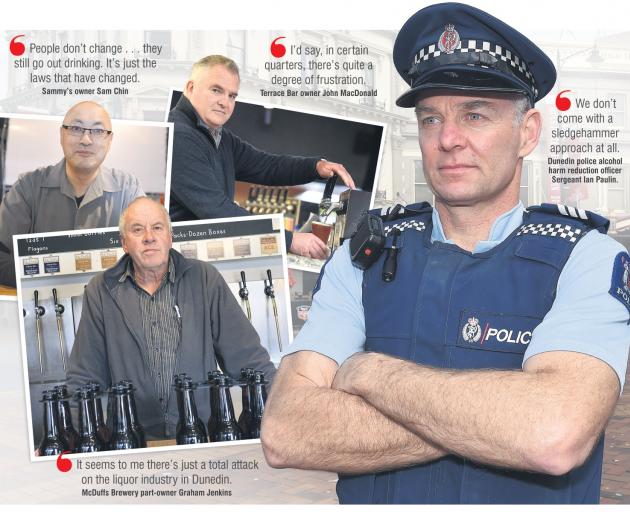
New rules designed to curb the worst excesses of our booze culture are beginning to bite, but sections of Dunedin’s hospitality industry say they are now the target of a heavy-handed crackdown by officials. In the first of a three-part alcohol series, Chris Morris talks to those in the crosshairs.
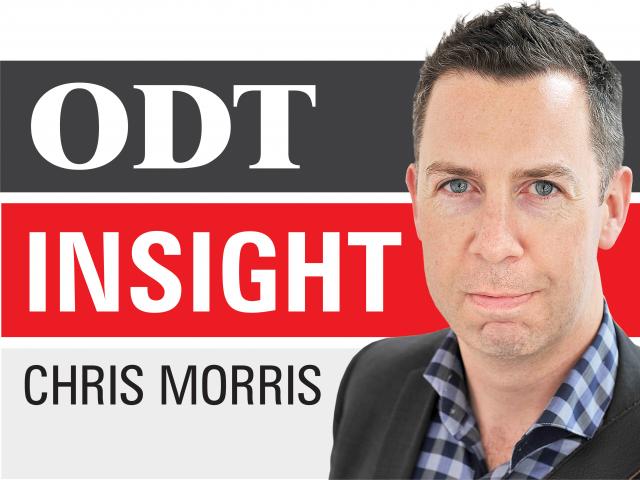
But the 55-year-old Dunedin businessman is still struggling to come to terms with his treatment at the hands of Public Health South.
Mr Loretan, who has run the 140-year-old South Dunedin soft drink institution, Wests, for nearly a decade, found himself locked in a prolonged battle for his alcohol off-licence beginning in 2014.
For about 100 years, the store he now runs has sold a mix of cordial products and alcohol from the same premises.
But all that changed when Mr Loretan's alcohol off-licence came up for renewal.
After a series of hearings, inspections, allegations and an appeal, the Alcohol Regulatory and Licensing Authority (ARLA) last month stripped him of his off-licence and, with the stroke of a pen, cut his sales in half.
It was an outcome that Mr Loretan blamed on inflexible new rules introduced with the Sale and Supply of Alcohol Act 2012, which placed a focus on harm minimisation at the centre of the alcohol debate.
But it was one he also blamed on the over-zealous actions of officials within Public Health South and the Dunedin City Council's liquor licensing division.
And it is a concern echoed by others in the city's hospitality industry, who say they are facing an increasingly heavy-handed approach by liquor licensing officials, ODT Insight has found.
''Some people within local government seem to believe it's their job to just run around with clipboards and red tape and cause mayhem.
''I think there's a small group of bureaucrats ... who in my opinion have got too much power,'' Mr Loretan said.
It was an animosity that bubbled to the surface during Mr Loretan's hearing, after Medical Officer of Health Dr Marian Poore suggested his shop's mix of alcohol and soft drinks ''potentially grooms young people to the future use of alcohol''.
The comment outraged Mr Loretan, and, despite an apology from Dr Poore's counsel, still left a sting months later.
''There was a half-hearted apology by the lawyer, but it was never retracted, and that's something we cannot just forget,'' Mr Loretan said.
But, in the end, a century of alcohol sales at Wests was stopped on a point of law.
Dunedin's district licensing committee (DLC) had twice granted Wests' off-licence renewal, only for the decision to be appealed by Public Health South (PHS) and a DCC liquor licensing inspector.
ARLA upheld the appeal, confirming retail outlets like Wests could not hold an off-licence unless their alcohol sales amounted to 85% of total trade.
The rule was designed to promote harm minimisation by restricting the proliferation of dairies and similar outlets selling alcohol.
But it also meant arguments by Mr Loretan that Wests was not contributing to alcohol abuse - accepted by both the DLC and ARLA - counted for nothing.
''In the end we got pinged, and the licence was removed, because there was no box to tick for us ... and that's crazy,'' Mr Loretan said.
It was an outcome that prompted a public outcry and concerns that rippled across the city's hospitality industry.
Some business owners would not speak publicly, saying they feared repercussions when their alcohol licences were next up for renewal.
But others criticised the tactics used to pass judgement on the city's hospitality industry as everything from ''pathetic'' to ''bullying''.
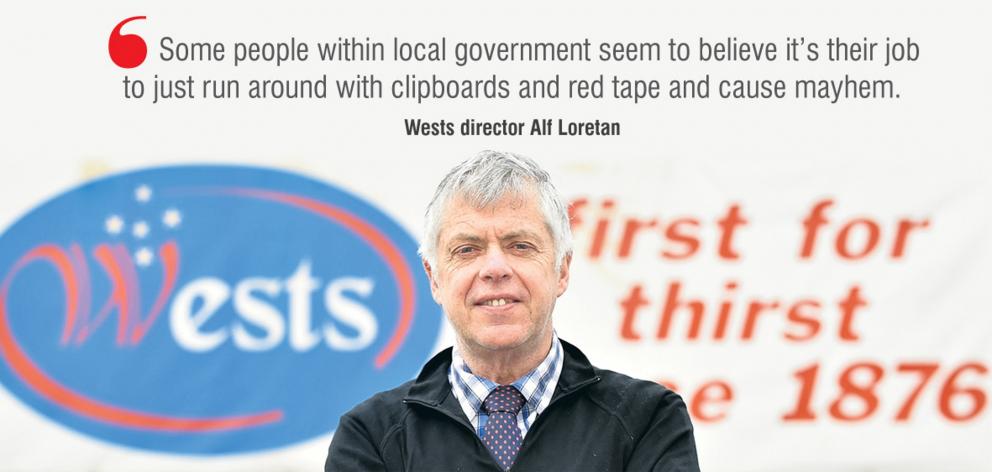
That included McDuffs Brewery part-owner Graham Jenkins (70), a 20-year hospitality industry veteran, who said officials now treated the industry as ''the big evil''.
''It seems to me there's just a total attack on the liquor industry in Dunedin.
''We're not a bunch of out-of-control cowboys, and the way they're treating people - it's like we're bloody idiots.''
The changes introduced with the new Act had handed a greater role to PHS staff, who now joined police and liquor licensing officials in assessing the suitability of the city's venues.
But Mr Jenkins said their public health focus meant they were ''obviously anti-alcohol'', and the process was now more ''confrontational'' and costly for businesses forced to fight for their licences.
''Since that happened, every time a licence comes up for renewal, I believe they look at it and they go through it with a fine-toothed comb [to see] if they can find some means to try to shut it down or restrict it.
''That's what happened to Wests ... I'm just appalled at what they subjected him to over about two years of his life, and got away with.''
The DCC's liquor licensing officials seemed to have adopted a similar tone, after promoting ''outrageous'' proposals including a rejected North Dunedin-wide liquor ban, ''bar spies'' inside venues and a draconian draft Local Alcohol Policy, he said.
''It concerns me when these people start using their positions - and public money - to push their own barrow.''
Members of the DCC's liquor licensing team declined to comment when contacted, referring questions to new chief licensing inspector Carlo Bell, who also declined, saying he was yet to start his new role.
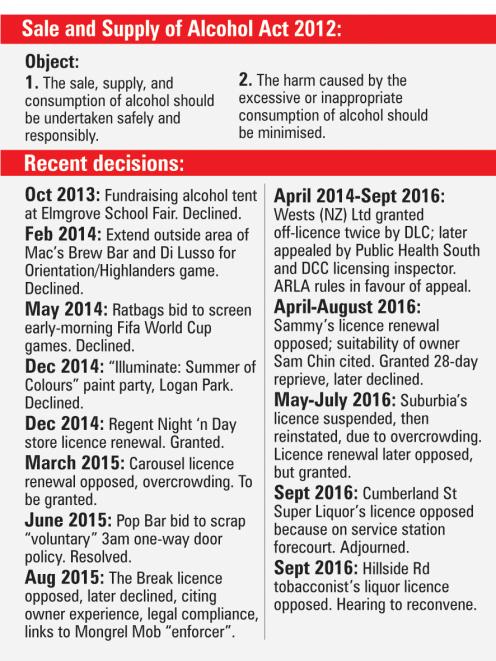
But Mr Jenkins said the new approach left licence holders ''extremely wary'' and reluctant to speak out.
''There's probably a little bit of an element of fear out there,'' he said.
Terrace Bar owner John MacDonald agreed, saying when approached ''you've got to be careful who you criticise''.
There had been a ''distinct change'' by authorities, including police, who appeared to be taking a tougher line, he said.
''I'd say, in certain quarters, there's quite a degree of frustration.''
Mr MacDonald said he could cite numerous examples, including being ''summonsed'' to the Central Police Station last year to discuss his application for a special licence to screen Rugby World Cup matches at breakfast time.
There he was initially told ''in no uncertain terms that 'you will not be able to show any of the rugby''' - before the application had even been to the district licensing committee.
Parliament eventually moved to permit the screenings, but police remained ''very, very anti the whole process,'' he said.
''The police are not the regulatory agency ... but they seem to have a lot of say in terms of policy, and what will happen and what won't happen,'' he said.
Mr MacDonald was also put before ARLA in 2014, after being caught with tables and chairs outside his Octagon bar beyond permitted hours.
The chairs were not being used, as it was pouring with rain, but had been left outside to avoid disrupting the still-full restaurant inside, he said.
Police appeared to treat the incident as a ''test case'' for their desire to see outdoor furniture removed from the Octagon earlier in the evening, he said.
''That cost me a significant amount of money in terms of lawyers' fees ... it was thrown out within 10 minutes by the judge, who said it was absolutely ridiculous,'' he said.
But, when renewing his on-licence recently, Mr MacDonald said he was threatened with another hearing unless he agreed to a 3am one-way door policy, a measure that remained voluntary in Dunedin.
''We were pretty much told 'if you don't accept the one-way door policy from 3am, we will object to your licence renewal'.''
It was the kind of approach that had also prompted an outcry in Wellington, where police were accused of trying to ''force'' tighter control of the city's nightlife earlier this year.
One of the capital's hospitality veterans, Nick Willis, told Fairfax bar owners were now so ''terrified'' of police they were reluctant to call an ambulance for drunk patrons, for fear of attracting police attention, as well.
And, just last week, pub and club owners in Christchurch went public with concerns they were being ''bullied'' and ''harassed'' by police.
The tougher line was also evident as a series of Dunedin businesses seeking new or renewed alcohol licences faced opposition from authorities at district licensing committee hearings.
That included heated debate this week over the fate of Cumberland St Super Liquor's off-licence.
Elsewhere in Otago, police initially objected to the Omakau trots special alcohol licence, citing concerns about the event's ''family picnic day'' BYO alcohol policy, before withdrawing their opposition earlier this month.
The Otago Racing Club also voluntarily abandoned its BYO policy, after intoxication levels at Wingatui's Melbourne Cup day caught the attention of police in 2014.
But Dunedin police alcohol harm reduction officer Sergeant Ian Paulin told the ODT the focus was on harm minimisation, not unfairly targeting licence-holders.
''I think there's some operators in the industry that have been around for a reasonable while, and they just haven't caught up with the changes in the legislation.
''Those smart operators, those ones who have moved with the times, and have read the legislation and know where they stand, are having no problems. We get on really well with them.''
He could not recall any meeting with Mr MacDonald to discuss Rugby World Cup matches, and licensing decisions were for the DLC to make.
But it was normal for police to call operators in to discuss concerns, he said.
''If there's issues, we'd rather sort them out with the applicant prior to going to a hearing.
''It's the handful of operators that don't comply with the law that, when they renew [licences], we will seek new conditions or oppose on whatever issues we've had, and bring that to the attention of the committee.''
The ARLA hearing over Mr MacDonald's outdoor furniture sought to clarify to what extent the central city's liquor ban trumped the DCC contract permitting the bar's furniture in the Octagon, Sgt Paulin said.

''We don't come with a sledgehammer approach at all ... going to a hearing is our last resort.''
Public Health South medical officer of health Dr Keith Reid also defended the new approach, saying PHS officials were now required to inquire into licence applications.
They reported to the DLC, monitored compliance and intoxication levels at events and shared information with other agencies, which could be used for enforcement action or in future hearings, he said.
PHS also had the option of scrutinising one-off special licence applications, but so far had chosen to do so in all cases, to promote its alcohol message, he said.
''We think this really gets to the heart of the culture of the relationship between the community and alcohol.''
PHS officials would also work with licence holders and warn them when liquor licence applications would be opposed, unless issues were addressed, he said.
''That's not bullying or coercing. That's us offering professional advice on how to comply with the legal requirements.''
Wests, in particular, had been a unique case and not a ''personal pursuit'' by PHS, he said.
''This is not personal. This is about the issues, and I think we have to remember that.''
Dunedin DLC chairman Colin Weatherall agreed the landscape had changed, as PHS was now ''far more active'' and with extra resources to match.
That did not mean they were ''anti-alcohol'', but they did have ''a very strong view'' about harm minimisation, he said.
''They're ensuring the standard is driven up.
''Of course, we're always going to have some crossed swords occasionally ... but the reality is we have to deal with the licensing laws.''
But, back in South Dunedin, that still left Mr Loretan questioning what had been achieved in his case.
''I don't see what they've gained, apart from hurting us ... anybody can buy a bottle of wine somewhere else.
''The shop was humming along before, and we need to figure out how to make this shop hum again.''
Comments
Was wondering how these legislative changes have been reflected at the Dunedin police social club/ bar. Have there been changes to the way it operates? Are incidents of intoxication managed and reported to any outside authority ?
Sgt Paulin may believe he isn't approaching business owners with a sledge hammer attitude, but perception is in the eye of the beholder. When that is the collective opinion of the few brave souls willing to comment then Sgt Paulin is wrong. He needs to reflect on comments, not just dismiss them.
Worse, Dr Reid and his crew seem to be determined to remove alcohol full stop. These people just seem to forget the idiocy of the US prohibition years that made ordinary people criminals and fostered the birth of the US mafia. He readily admits they do not have to engage in all special license applications, but actively want to to push their personal message. Just a shame we are paying the cost for their personal zeal. Cost in lost amenity and to pay their wages.



